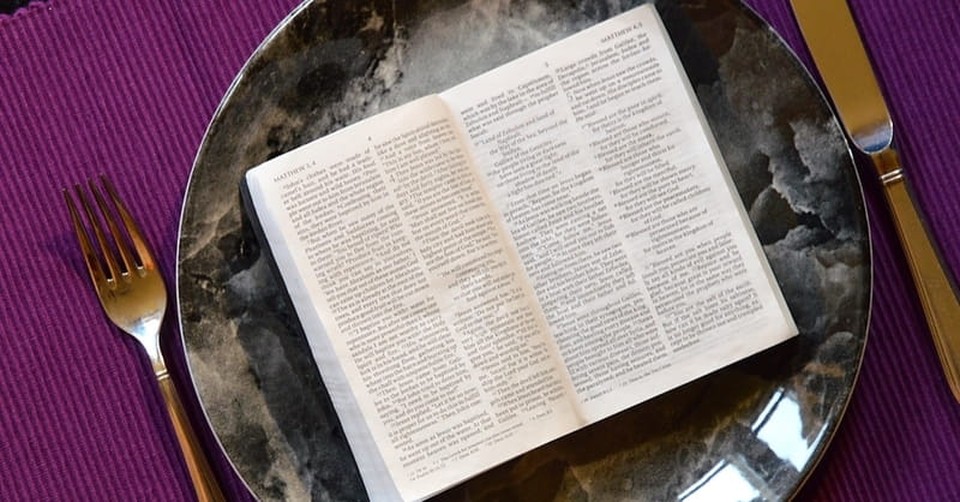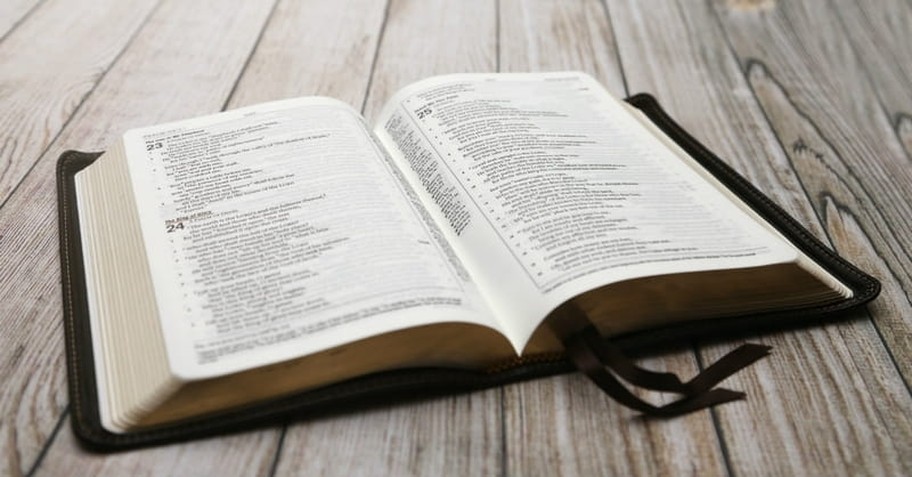Biblical Fast: A What, When, Why, How To Guide for Christians

If you've attended church for a while you've probably heard the word "fasting." But, what exactly is fasting? Why do we do it? How do we do it? And, what are some Biblical examples of fasting?
What is Fasting?
Fasting is essentially giving up food (or something else) for a period of time in order to focus your thoughts on God. While fasting, many people read the Bible, pray, or worship. Fasting is found throughout the Old and New Testaments of the Bible, over fifty times!
Fasting has a rich history in both the Old and New Testaments, serving as a powerful way to connect with God. In the Old Testament, people often fasted in times of deep sorrow or when they wanted to humble themselves before God. Take David in Psalm 35:13, for instance—he fasted to express his humility before the Lord. In the New Testament, fasting becomes a way to draw closer to God, centering one’s heart and mind on Him. Jesus exemplifies this in Matthew 4:1-2, fasting for 40 days in the wilderness to prepare for His ministry.
We’re also encouraged to keep our fasting between us and God; as Jesus teaches in Matthew 6:16-18, we shouldn’t appear somber to signal that we’re fasting. It’s a private practice, meant to nurture a quiet, deep relationship with God. Fasting often goes hand in hand with prayer, creating an intentional time of worship, like in Acts 13:3, where early Christians fasted and prayed together, or in Luke 2:37, where a widow faithfully fasted and prayed day and night.
Following the example of Jesus and the Early Church believers, we, too can draw near to God while fasting.
Photo Courtesy: Lightstock

What Does Fasting Do for Our Spiritual Life?
Fasting and prayer open our hearts to hear God’s voice more clearly. They reveal hidden areas of sin, strengthen our connection with Him, and help us pray with pure intentions. Together, they deepen our faith, allowing us to focus fully on God and draw nearer to Him, transforming our hearts in the process.
Fasting and prayer involve setting aside meals or activities to fully dedicate ourselves to God. This dedication makes us more sensitive to His voice, ready to receive what He wants to reveal. Through gentle whispers, God may show us what lies behind our actions—our true motives—perhaps uncovering moments of manipulation or hurtful intentions we may not have realized. This insight, like a light in darkness, brings a moment of shock and humility. But instead of shame, our Savior lifts our gaze, inviting us to repent and find forgiveness in His loving eyes. We move from hiding to praising the One who reveals our wrongs and guides us toward growth and worship.
Photo Courtesy: Thinkstock

Types of Fasting
Fast from Food: Fasting from food—whether partially or entirely—can be a powerful way to humble oneself and seek God’s provision. Through hunger, we’re reminded of our dependence on God, and it draws us closer to Him as we focus on prayer and spiritual nourishment rather than physical sustenance.
Social Media Fast: Stepping back from social media helps quiet distractions, giving more time to listen for God’s voice. Free from constant updates and comparisons, we can focus on who we are in Christ and grow spiritually through face-to-face interactions that foster genuine connection and encouragement.
Fast from Television and Streaming: By fasting from entertainment screens, we create space for God to renew our minds. It allows us to engage in reflective activities like prayer, study, or quality time with loved ones, making room for God to work in times that might typically be filled by distraction.
Fast from Sugar and Processed Foods: Abstaining from sugar and processed foods can clarify both mind and body, allowing us to offer our best selves to God. It teaches discipline, while also honoring the body as the temple of the Holy Spirit by choosing healthful, God-honoring foods.
Shopping Fast: Taking a break from non-essential shopping redirects our focus to God’s provision and helps curb material desires. This fast cultivates gratitude, enabling us to find satisfaction in God’s gifts and avoid the distraction of consumerism.
Caffeine Fast: Taking a break from caffeine dependency helps us rely on God’s strength for our energy. It teaches us to rest in Him rather than stimulants, supporting a more balanced, God-centered lifestyle that honors our health and well-being
Photo Courtesy: Unsplash

What You Need to Know about Fasting from Food and Drink
When starting to fast, it's essential to ease into the practice, especially if you’re new to it and unaccustomed to its physical effects. Don’t jump straight into an extended water fast! Instead, consider skipping one meal a day for a few days, and use that time for prayer while setting aside the saved money to help those in need.
If this is your first time fasting, know that initial dizziness or headaches are normal and part of the body's natural cleansing process, which should ease over time. When ending your fast, reintroduce food gradually, starting with fresh fruits and vegetables, and avoid overindulging. Though you might crave heavier foods, like pizza, exercising self-restraint will help your body readjust smoothly.
Always keep dietary needs in mind, particularly if you have health conditions like diabetes or other medical requirements. Fasting may not be suitable for everyone, especially for those dealing with eating disorders. The purpose of fasting is to deepen your focus in prayer, drawing you closer to God, empowering your spirit, and enriching your connection with Him.
For more Practical Guidelines for Fasting, click here.
Photo Courtesy: Pexels

How Long Should I Fast?
Examples of fasting lengths in the Bible:
-One day or part of a day (Judges 20:26; 1 Samuel 7:6; 2 Samuel 1:12; 3:35; Nehemiah 9:1; Jeremiah 36:6)
-A one-night fast (Daniel 6:18–24)
-Three-day fasts (Esther 4:16; Acts 9:9)
-Seven-day fasts (1 Samuel 31:13; 2 Samuel 12:16–23)
-A fourteen-day fast (Acts 27:33–34)
-A twenty-one day fast (Daniel 10:3–13)
-Forty-day fasts (Deuteronomy 9:9; 1 Kings 19:8; Matthew 4:2) and
-Fasts of unspecified lengths (Matthew 9:14; Luke 2:37; Acts 13:2; 14:23).
Occasional Short Fasts
Whether denying yourself food or some other pleasure, an occasional fast that lasts six, twelve, or twenty-four hours is the most manageable... You are not necessarily making a commitment to do this type of fast again, as it is a one-time fast for a specific purpose.
Intermittent Fasts
This is normally a regular act of abstinence, for example one day a week. You may abstain from food, or make some other sacrifice. This type of fast is a way of integrating the spiritual discipline of fasting into your life on an ongoing basis.
Longer Fasts
Longer fasts likewise can take the form of abstinence from food or some other sacrifice. Some good options for a non-food fast would be abstaining from watching TV from Monday to Friday, reading a biography of a great man or woman of God each week, or dedicating every evening for a week to praying with friends...A longer water-only fast might last from one to three days. If you are fasting from something other than food, your longer fast might last a week. Some use Lent as a time for a longer fast.
Extended Fasts
This is the hard path of fasting—choosing to give up something that you need or value for an extended period of time. One non-food extended fast would be to get up an hour earlier each day for a month in order to pray, worship, or read Scripture or a Christian book.
Open-ended Fasts
Some extended fasts are open-ended, for example, where you make a commitment not to break your fast until your goals have been achieved. Defining your goals is particularly important here. Again, this type of fast should not be considered until you have gained some experience.
Occasional Group Fasts
Such fasts can be called by a church or a group of churches or, on a larger scale, even to a nation during a time of crisis. Alternately, such fasts can be called by a small group or even by a Christian business. With the right leadership, calling groups to prayer and fasting can be a very powerful tool.
Longer Group Fasts
The range of options for a group fast is extensive. Are you all going to fast at the same time, or are you setting up a rotation? If you are going to do a water-only fast, are there some who need to do a partial fast for health reasons? Is this an open-ended fast until a goal is achieved, or are you fasting for a specifically defined period?
Photo Courtesy: Unsplash

Fasting Life-Hacks
10 tips for successful fasting:
Start Small: Begin with shorter fasts to build your practice gradually, like skipping one meal, to prepare for longer fasting periods.
Define Your Purpose: Enter your fast with a clear spiritual purpose, such as drawing closer to God or seeking His guidance.
Plan Prayer Times: Replace mealtimes with prayer and Bible study to deepen your focus on God rather than simply abstaining from food.
Stay Hydrated: Drink plenty of water throughout your fast, as staying hydrated is crucial for both physical and mental well-being.
Set a Specific Duration: Decide on a fasting period that suits you—this could be from morning to evening, or one meal for several days.
Consider an Alternate Fast: If a full food fast is challenging, try alternatives like abstaining from certain foods, activities, or media.
Prepare for Discomfort: Expect mild symptoms like hunger or fatigue as your body adjusts. This discomfort can be part of the spiritual growth process.
Break Your Fast Wisely: End the fast with light, nutritious foods like fruits and vegetables to ease your body back to regular meals.
Avoid Fasting for Show: Fast in private, focusing on your relationship with God, rather than announcing your fast to others.
Reflect and Pray: After fasting, spend time in reflection and thankfulness, asking God to reveal what He taught you during this time
Photo Courtesy: Thinkstock

Bible Verses about Fasting
Acts 14:23: “Paul and Barnabas appointed elders for them in each church and, with prayer and fasting, committed them to the Lord, in whom they had put their trust.”
Daniel 10:3: “I ate no choice food; no meat or wine touched my lips; and I used no lotions at all until the three weeks were over.”
Esther 4:16: “Go, gather together all the Jews who are in Susa, and fast for me. Do not eat or drink for three days, night or day. I and my attendants will fast as you do. When this is done, I will go to the king, even though it is against the law. And if I perish, I perish.”
Exodus 34:28: “Moses was there with the LORD forty days and forty nights without eating bread or drinking water. And he wrote on the tablets the words of the covenant—the Ten Commandments.”
Joel 2:12: “Even now,” declares the LORD, “return to me with all your heart, with fasting and weeping and mourning.”
Luke 2:37: “and then was a widow until she was eighty-four. She never left the temple but worshiped night and day, fasting and praying.”
Luke 4:2-4: “where for forty days he was tempted by the devil. He ate nothing during those days, and at the end of them he was hungry. The devil said to him, “If you are the Son of God, tell this stone to become bread.” Jesus answered, “It is written: ‘Man shall not live on bread alone.’”
For the Top 40 Bible Verses about Fasting, click here.
Photo Courtesy: Thinkstock

More About Fasting
For more information on fasting, visit these links:
What Christians Need to Know about Fasting
Baker's Evangelical Dictionary of Biblical Theology - Fast, Fasting
Smith's Bible Dictionary - Fasts
10 Things You Should Know about Fasting
2 Practical Tips When Considering a Fast
10 Tips for Successful Fasting
What Evangelicals Need to Know about Fasting for Lent
Photo Courtesy: Unsplash
Originally published January 22, 2020.








